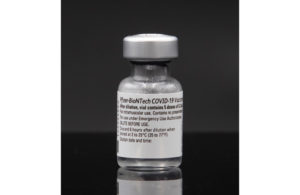
Pfizer-BioNTech vaccine (Image courtesy of Wikipedia)
The FDA announced today that it is allowing undiluted, frozen vials of the Pfizer-BioNTech COVID-19 vaccine to be transported and stored for up to two weeks at conventional temperatures commonly found in pharmaceutical freezers.
The decision should allow for wider distribution of the vaccine to sites that do not have ultra-low temperature freezers.
Pfizer asked the agency for the change last week, citing data demonstrating that the vaccine remains stable after undiluted vials are stored at -25°C to -15°C (-13°F to 5°F), temperatures commonly found in pharmaceutical freezers and refrigerators. That’s a big change from the original FDA emergency use authorization, which required the vaccine to be stored at ultra-low temperatures — between -80ºC to -60ºC (-112ºF to -76ºF).
However, vials that have been thawed before dilution may still only be held in refrigeration for up to five days, and vials thawed after dilution must be used within six hours, the agency said, adding that it has updated instructions to vaccine providers.
“This alternative temperature for transportation and storage of the undiluted vials is significant and allows the vials to be transported and stored under more flexible conditions,” said Peter Marks, director of the FDA’s Center for Biologics Evaluation and Research, in a news release. “The alternative temperature for transportation and storage will help ease the burden of procuring ultra-low cold storage equipment for vaccination sites and should help to get vaccine to more sites,”
Pfizer and BioNTech intend to submit the same data to other countries’ vaccine regulators.
“We have been continuously performing stability studies to support the production of the vaccine at commercial scale, with the goal of making the vaccine as accessible as possible for healthcare providers and people across the U.S. and around the world,” said Pfizer CEO Albert Bourla said at the time.
“The data submitted may facilitate the handling of our vaccine in pharmacies and provide vaccination centers an even greater flexibility,” added BioNTech CEO Ugur Sahin. “We will continue to leverage our expertise to develop potential new formulations that could make our vaccine even easier to transport and use.”


